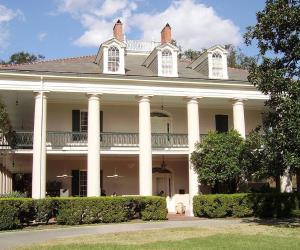Oak Alley Plantation

Oak Alley Plantation is a historic plantation located on the west bank of the
Mississippi River, in the community of Vacherie, St. James Parish, Louisiana.
Oak Alley is named for its distinguishing visual feature, an alley (French allé
) or canopied path, created by a double row of southern live oak trees about 800
feet (240 meters) long, planted in the early 18th century long before the
present house was built. The allé or tree avenue runs between the home and the
River.
The most noted slave who lived at Oak Alley Plantation was named Antoine. He was
listed as "Antoine, 38, Creole Negro gardener/expert grafter of pecan trees,"
with a value of $1,000 in the inventory of the estate conducted upon J.T.
Roman's death.
Antoine was a master of the techniques of grafting, and after trial with several
trees, succeeded in the winter of 1846 in producing a variety of pecan that
could be cracked with one's bare hands; the shell was so thin it was dubbed the
"paper shell" pecan. It was later named the Centennial Variety when entered in
competition at the 1876 Centennial Exposition in Philadelphia, where it won a
prize.
Josephine Stewart left the historic house and grounds to the Oak Alley
Foundation when she died in 1972, which opened them to the public.
Location
3645 LA-18
Vacherie, St. James County
Louisiana,
USA
Getting There
There is no direct public transportation available to Oak Alley Plantation. The
best way to get there would be by car or by taking a tour. There are several
tour companies that offer transportation from New Orleans to Oak Alley
Plantation, which can be booked in advance. Alternatively, you can rent a car in
New Orleans and drive to the plantation yourself.
Nearby Airports
This is a list of primary airports in Louisiana that have scheduled passenger service on commercial airlines.
undo Major Attractions in Louisiana